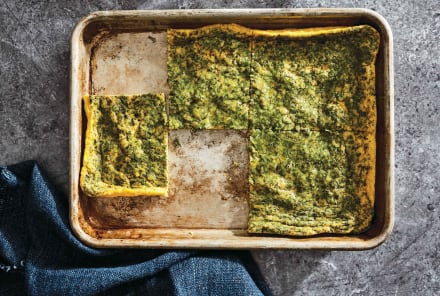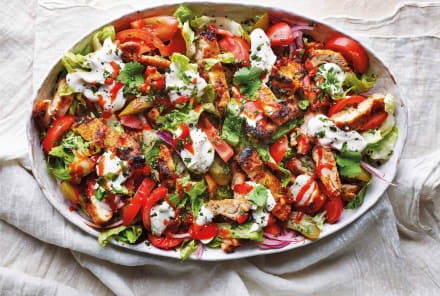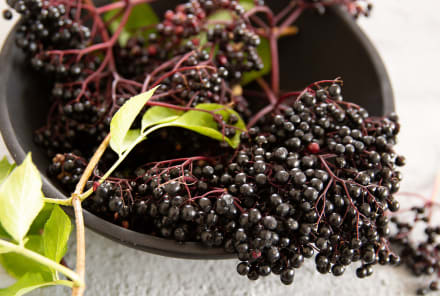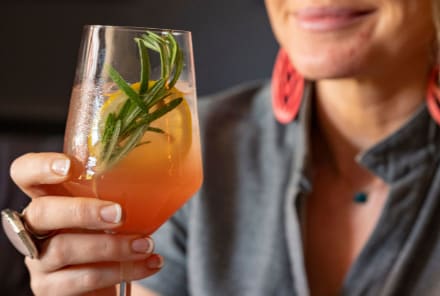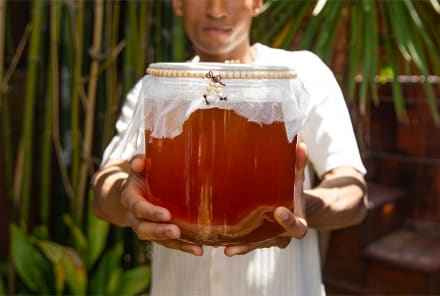Advertisement
Could You Have An Almond Intolerance? How This Nut Affects Your Gut


Imagine this scenario: You've eliminated all gluten from your diet. You’re partial to almond milk, and you're religious about checking food labels for gluten, but you’re still experiencing some abdominal discomfort or pain. Is your body relapsing from gluten, or is there something else going on?
If this sounds familiar, you might want to take a deeper look at your diet and answer this surprising question: How often are you eating almonds?
How almonds affect your gut.
Below are the ten most frequent sources of almonds I see in the food diaries of my gluten-free, dairy-free clients:
- Smoothies made with almond milk or almond butter
- Chia pudding made with almond milk
- Coffee with almond milk
- Avocado on gluten-free toast made with rice and almond flour
- Raw vegan treats made with almonds
- Paleo cookies made with almond flour and almond butter
- Gluten-free crackers made with almond flour
- Raw almonds
- Vegetables tossed with almonds
- Almond butter with fruit
After noticing how many almonds my clients ate in a single day, the question certainly became warranted—are almonds to blame for that similar, gluten-induced pain?
Here’s the truth: If you're eating almonds twice or more a day, you might be over-exposing yourself to almonds, much like you might have done with gluten. Gluten, as we know, can be very abrasive to the digestive tract, often initiating leaky gut in some gluten intolerant individuals. Almonds, especially when eaten raw, can also be abrasive to the digestive tract, as they contain phytic acid, which is indigestible1 by humans.
“The phytic acid presence is much higher in raw almonds,” says immunologist Tania Elliott, M.D., FAAAAI, FACAAI. “Which is why I recommend soaking your almonds or choosing a roasted almond, which reduces the phytic acid levels ultimately decreasing the levels of digestive discomfort."
The solution? Keep your almonds to a healthy minimum.
That said, you might want to think about soaking your nuts, which breaks down the phytates and might make them easier to digest.
You can also lessen your almond-intake as a whole and become more savvy with gluten and dairy-free options. You can mix up your nut milks (try coconut, hemp, cashew, sunflower, and hazelnut), substitute gluten-free packaged goods for vegetables (yes, vegetables—you don't need the bread or crackers!) and limit your almond-filled vegan and Paleo treats to once per week.

Dana James is a Columbia University–educated nutritional therapist and founder of Food Coach NYC. She holds her master's in clinical nutrition and is trained in nutrition biochemistry, functional medicine, and cognitive behavioral therapy. She believes that food should be viewed as nourishing, joyful, and fundamental to self-care. Her goal is to help women break their antagonist (and often obsessive) relationship with food and their bodies. She believes that true beauty stems from grace, dignity, and embracing our idiosyncrasies that make us unique and imperfect.
James created the "How to Ditch Sugar" video series for mindbodygreen. Check out the program here: How to Ditch Sugar.
James coaches one on one, runs workshops in NYC and LA, and holds tele-seminars on various topics that help women lead a more beautiful and balanced life. To connect more with James, check out her Instagram account and sign up for her biweekly Sunday-evening emails.
More from the author:
How To Ditch Sugar
Check out Break Free From Your Sugar Addiction To Feel More Vibrant & Clear-Headed
More from the author:
How To Ditch Sugar
Check out Break Free From Your Sugar Addiction To Feel More Vibrant & Clear-Headed

Dana James is a Columbia University–educated nutritional therapist and founder of Food Coach NYC. She holds her master's in clinical nutrition and is trained in nutrition biochemistry, functional medicine, and cognitive behavioral therapy. She believes that food should be viewed as nourishing, joyful, and fundamental to self-care. Her goal is to help women break their antagonist (and often obsessive) relationship with food and their bodies. She believes that true beauty stems from grace, dignity, and embracing our idiosyncrasies that make us unique and imperfect.
James created the "How to Ditch Sugar" video series for mindbodygreen. Check out the program here: How to Ditch Sugar.
James coaches one on one, runs workshops in NYC and LA, and holds tele-seminars on various topics that help women lead a more beautiful and balanced life. To connect more with James, check out her Instagram account and sign up for her biweekly Sunday-evening emails.
Watch Next
Enjoy some of our favorite clips from classes
Enjoy some of our favorite clips from classes
What Is Meditation?
Mindfulness/Spirituality | Light Watkins
Box Breathing
Mindfulness/Spirituality | Gwen Dittmar
What Breathwork Can Address
Mindfulness/Spirituality | Gwen Dittmar
The 8 Limbs of Yoga - What is Asana?
Yoga | Caley Alyssa
Two Standing Postures to Open Up Tight Hips
Yoga | Caley Alyssa
How Plants Can Optimize Athletic Performance
Nutrition | Rich Roll
What to Eat Before a Workout
Nutrition | Rich Roll
How Ayurveda Helps Us Navigate Modern Life
Nutrition | Sahara Rose
Messages About Love & Relationships
Love & Relationships | Esther Perel
Love Languages
Love & Relationships | Esther Perel
What Is Meditation?
Box Breathing
What Breathwork Can Address
The 8 Limbs of Yoga - What is Asana?
Two Standing Postures to Open Up Tight Hips
How Plants Can Optimize Athletic Performance
What to Eat Before a Workout
How Ayurveda Helps Us Navigate Modern Life
Messages About Love & Relationships
Love Languages
Advertisement

How To Use Food To Recover From Autoimmunity: An MD's Top 4 Tips
Sara Szal Gottfried, M.D.
